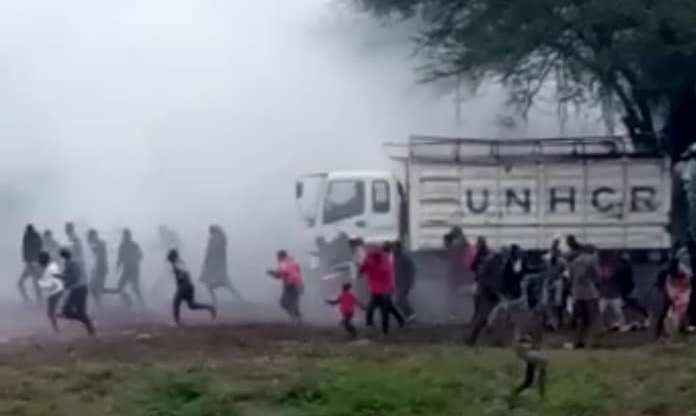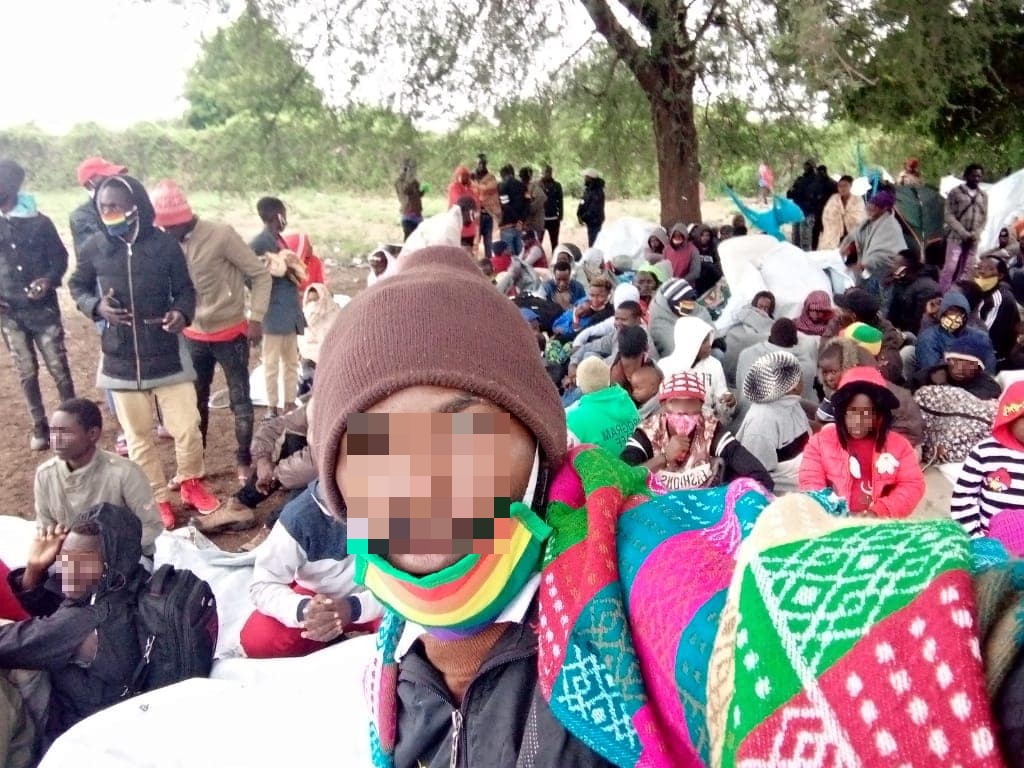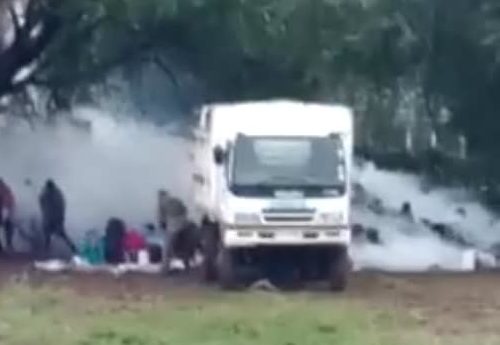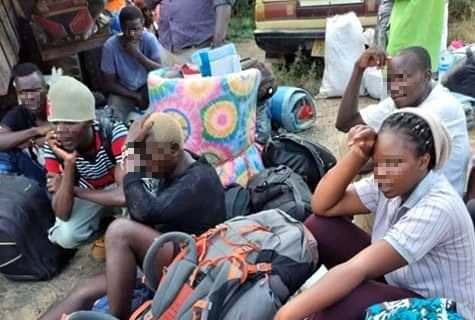Queer refugees subjected to daily anti-LGBT+ violence say they were ‘teargassed and brutally assaulted’ by police while protesting their plight

Harrowing footage seen by PinkNews shows Kakuma refugee camps sprinting as teargas engulfs them. Multiple nondescript bangs can be heard in the distance. (Screen capture via Facebook)
Harrowing footage seen by PinkNews shows Kakuma refugee camps sprinting as teargas engulfs them. Multiple nondescript bangs can be heard in the distance. (Screen capture via Facebook)
A protest staged by embattled and exhausted LGBT+ refugees from a camp in Kakuma, Kenya ended in violence as police officers allegedly “teargassed, beat and brutally assaulted” demonstrators.
Queer refugees donned rainbow face masks for a peaceful protest outside the United Nations High Commissioner for Refugees’ (UNHCR) office in the northwestern town.
The group – adults and children alike, many fleeing from neighbouring Uganda’s vicious anti-LGBT laws – have reported being under siege from assaults in recent months at the Kakuma refugee camp.
The pathos of their plight came as gay refugee and father-of-one was found dead in a suspected suicide outside the UNCHR offices in Nairobi. Adroa (not their real name) said this “sparked” the surging need to protest.
Demonstrators were calling on UNHCR organisers for increased camp security after months of being pelted with violence from Kakuma locals and fellow refugees.
After three days of sleeping on the dirt track in thin bedding and plastic containers, with many having not eaten for days, the 150-strong group were confronted by riot police, according to interviews with camp residents and footage seen by PinkNews.

Using backpacks as pillows, countless queer refugees from the Kakuma refugee camp dotted the grounds of UNHCR for a peaceful protest. One held amid the country’s lockdown measures, cautious campers wore LGBT+ Pride flag face masks. (Facebook)
LGBT+ refugees in Kenya stage peaceful protest.
LGBT+ refugee leaders organised to leave the camp and re-locate outside the UNHCR main offices on April 27, Adroa said.
The aim of the protest was “to seek protection following continued persecutions, attacks and death threats in the camp,” they added.
UNCHR representatives said authorities were ordered to disband the demonstration on April 30, citing concerns over the spread of coronavirus. Refugees were, they added, given an hour to dissolve.
In alarming footage seen by PinkNews, the once still protest flared as smoke engulfed the grounds as riot officers lobbed teargas bombs against the refugees to force them to disassemble.
The hissing of tear gas canisters cut into the rabble. Then, all Adroa could hear were screams.
Adroa said that protesters “were teargassed, beaten and brutally assaulted” by police who then forced the refugees back to the camp.
Camp leader Sebuuma Stephen claimed that babies as young as five months, a pregnant woman and several asthmatic people were caught in the teargas fumes.
Eight members fainted as a result, Stephen continued, noting that the protesters scattered into surrounding bushes for safety.

Footage shakily recorded on a queer camp resident’s mobile showed refugees fleeing as plumes of teargas wrap around them in Kenya. (Screen capture via Facebook)
Police relocated the refugees to the camp reception after the clash, further footage showed, where at least one LGBT+ asylum seeker was shown spluttering and lying on the ground.
“We cried but our pleas were unheard,” Adroa said, describing the fear they felt of being plunged back to the camp where countless acts of violence against them have taken place.
About 11 people who sustained minor injuries were taken to a hospital, treated, and released back to the camp, a UNHCR spokesperson said.
Since being relocated to Block 13 of the camp, according to interviews with queer refugees conducted by PinkNews, residents are nervously budgeting their money for food while many reported a lack of shelter.
“We are sleeping outside,” Adroa alleged, “we have no food.”
This is not the first time campers have hoped to amplify their plight. In an all too familiar sight, an amicable protest in December 2019 also ended with plumes of teargas hurled by law enforcement.

A group of LGBT+ refugees wait outside the UNCHR offices. (Facebook)
UNHCR introduce police patrols around Kakuma camp to protect LGBT+ refugees.
The agency’s representatives disputed claims of violence against refugees during the demonstration, the Bay Area Reporter stated.
During the protest, UNHCR officials negotiated with the demonstrators and agreed to increase security including a one-hour police response time and a 24-hour security helpline.
The agency also agreed to provide a counselling service for individual members, a spokesperson said.
Officials stressed that the demonstration put the “health of protesters and others at risk” by not adhering to social distancing measures.
The camp has since been under government-enforced lockdown since May 1.

